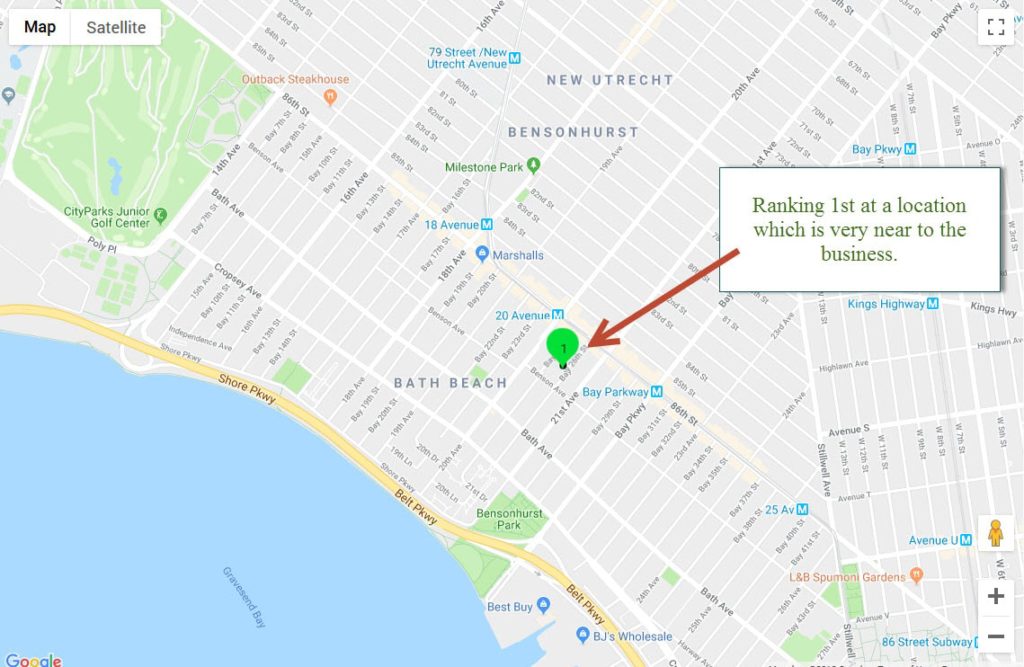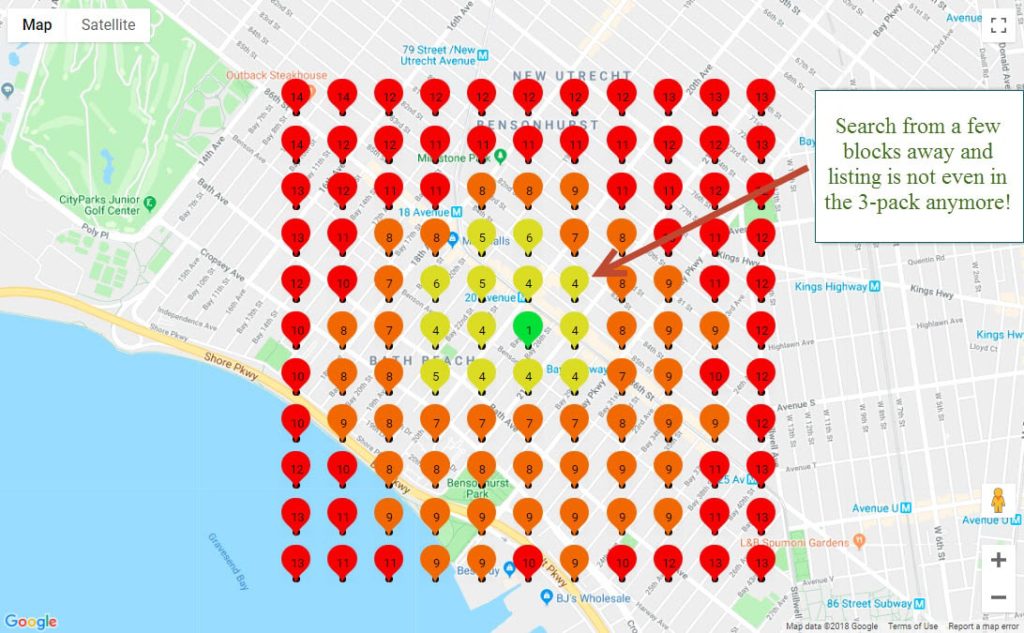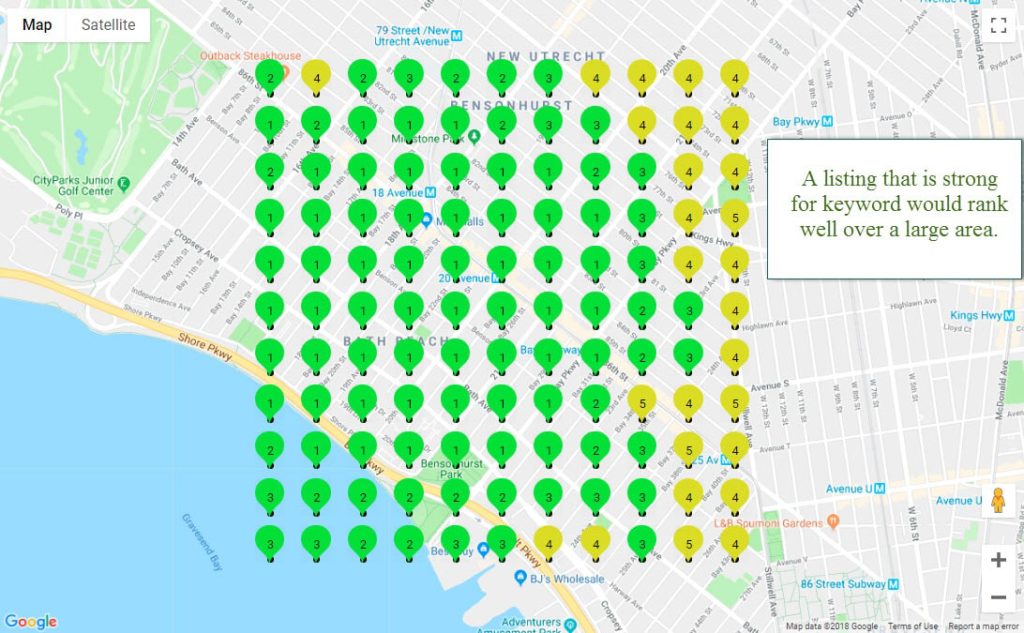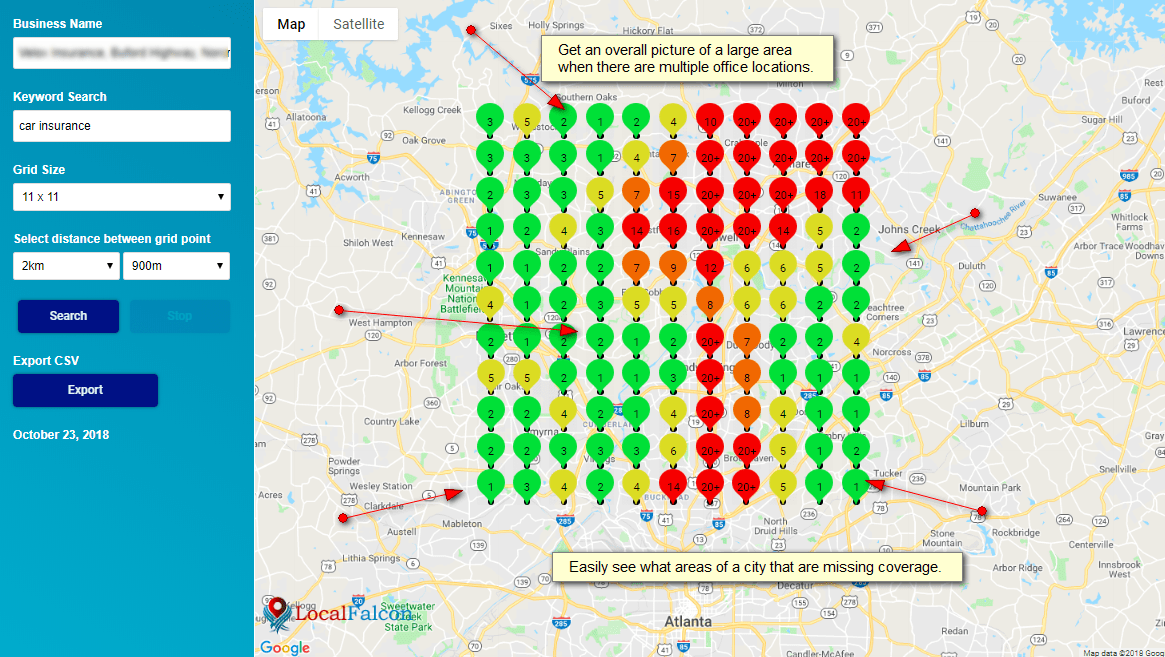Tracking local rankings is a tricky matter if you’re a business owner or professional SEO, and even more so if you’re a maker of rank-tracking software. Yet a local-rankings tracker called Local Falcon came out recently and already has carved out a niche.
Local Falcon does one thing: It shows and tracks Google Maps rankings for bricks-and-mortar businesses. If that describes your need, you may like Local Falcon’s new approach to the old and irritating problem of figuring out how visible you are on the local map.
Recently I had a good chat with the creator of Local Falcon, Yan Gilbert. Afterwards I sent him some questions I thought would be on your mind, as a person who does local SEO for your business or for someone else’s. Yan’s answers (below) should tell you how Local Falcon is different, how it might be useful for your business, and how best to use it.
—
Phil: What’s your “elevator” pitch for Local Falcon?
Yan: Local Falcon breaks the standard pattern of rank trackers because it was designed specifically for Google Maps and sometimes needs a bit of explaining for people to see the real value of it.
Local Falcon is an exciting new tool that lets you visualize local rankings in a new and easy-to-understand way. The user quickly sees how well a listing is ranking in the area surrounding the business.
The way it works is very visual, so let me share a few images to explain the point.
A regular one-point data rank tracker result, such as a ZIP code, might look like this:

Ranking #1 for the keyword in my ZIP code – but is that really enough data to base a decision on? Here’s what you might see in Local Falcon:
Local Falcon shows you the full picture of the ranking coverage area for that keyword.
You can then confidently decide if you need to continue optimizing for a keyword within a few seconds after looking at a scan that has returned results such as these. No other rank scanner does this.
Ultimately, Local Falcon will save you time in your analysis. With one scan, you can get over 100 data points visualized in a very easy to understand way. Compare this with having to set up dozens of data points in a normal rank tracker, and then trying to understand how the jumble of ZIP code placements over a city fit together.
Phil: Tell me briefly how Local Falcon differs from other local rank-tracking software.
Yan: Local Falcon is very different than other local rank tracking software because it’s the first rank tracker specifically designed for checking Google Maps results. Every other tracker out there is designed to track organic rankings, and have appended Maps tracking capabilities.
Local Falcon starts with the map, and checks rankings based on distance away from the business and then displays them in a way that is easy to understand. There are no ZIP codes involved. ZIP codes have no bearing on ranking; proximity does.
Phil: Whom is Local Falcon geared toward, and who probably wouldn’t have as much use for it?
Yan: Since Local Falcon is designed to help businesses easily visualize their rankings, marketing experts at an agency and owners of small-to-medium businesses will find value in using this tool. It is especially helpful for businesses with multiple locations because you can scan an entire city in one pass and really understand what is going on.
Phil: What does the “Falcon” part refer to?
Yan: A falcon flies and looks down at the area below it, which is what my tool does. It’s also a predator, a quick hunter, and so these connotations fit as well because as a marketer my job is to help find the information to help businesses grow. And that’s what this tool is designed for: to help you to make decisions to help expand your business.
We spent a lot of time to come up with the name because it was important to get it just right. But there were many constraints. I went through hundreds of combinations and this was the name that grew on us.
Phil: Tell me a little about you. What’s your “day job,” and what’s your background (if any) in local SEO and in software?

Yan: I’ve been doing SEO for over ten years and local SEO for about two. I had my own clients, which was working well, but then I got a call from Joy Hawkins when she was just starting her own agency, and I didn’t want to pass up that opportunity. It was a very good decision because she really has imparted me with a lot of knowledge and encourages everyone on the team to continuously improve.
As for software, I designed the tool with the user in mind; although I’m not the actual coder of the tool, I know what the tool needs to do to be useful, and that’s my main goal.
Phil: What’s the story behind Local Falcon? What made you want to make it? What gap do you want it to fill?
Yan: Last year, I came across a browser plugin that allowed me to easily change the location data that the browser was sending. This was great because I could quickly simulate a Google search from anywhere and I could easily check rankings for clients without doing a full setup in a regular rank tracker.
There were other plugins that did a similar job but they were a pain to use because you had to input a new locations, or a set of GPS coordinates every time. This other plugin let you pick a spot on the map. After a few days of using it, I had that “eureka moment” where I thought to myself, ‘If I can do this manually.. pick a spot/scan, pick a new spot/scan etc.. then surely it can be programmed.’
I looked around the SEO tool universe and nothing like it existed yet.
At that point, I considered if I should undertake creating the tool myself and eventually my enthusiasm for the idea won out.
Phil: What’s your biggest gripe about other rank-trackers?
Yan: The main problem stems with the fact that with Maps results, you need to pick a spot to track from. Whether it be a ZIP or postal code, you are choosing one spot. You can always scan from multiple spots, but because the other tools are not designed for it, it becomes very difficult to put that data together to understand rankings across a large area or part of a city.
Phil: Why did you want to get into software?
Yan: A co-worker once described me as passionate while I was on a SEO call with a client. I felt that this tool needed to be built for all local SEOs out there. Sure, I could have sat back and at some point someone else might have built something similar, but I didn’t want to have that regret. I knew that no other software had anything like this. And when you have an idea–a new idea that you think is worthwhile to pursue–sometimes you just have to go out there and try it.
Phil: Back to Local Falcon. What’s the closest thing to it, in terms of other rank-tracking (or other) software?
Yan: I’m not familiar with every software, but through my work with Joy, I had access to many of the top tools that SEOs use. For local tracking, we continue to use Bright Local which does a great job, but it has the same limitation as all the other trackers in that it’s based on choosing one location to scan from at a time. This only gives you one data point to make decisions from. It’s quite limiting because it’s difficult to piece the different locations together into a whole. My blog post here gives a good explanation of why: Why You Need to Be Scanning Multiple Map Location Points For Local Rank Tracking.
Phil: You want to get people to look at rankings a different way. How should I look at rankings, and what mistake am I probably making now?
Yan: I think the old paradigm of checking by ZIP codes has run its course. Proximity of the searcher to the business is what is important, and using specific geo coordinates gives much more accurate results.
Google has made huge changes to the way local search results work, but the rank trackers are still using methods developed for organic search. We can do better than simple plotted line graphs. As Google evolves, so must the tools.
Phil: You use the Google API, rather than scrape the search results. Why? How does that help you and help the user? (I know you don’t have to buy IPs/proxies.)
Yan: It was one of those decisions that was made at the outset of the project. Rank trackers need to scrape because there is no API for organic results; it’s the only way to get the data. But there is an API for Google Places and I felt comfortable going that way. At the time, I didn’t realize the limitation we would encounter for listings with hidden addresses.
As well, working with Joy (where we are constantly trying to get rid of listings that break Google guidelines) scraping Google, which is technically not allowed, didn’t feel right. I had an alternative. I also didn’t want that worry hanging over my head of dealing with hundreds of proxies that need to be scaled up. What happens when they get banned, for instance? It happened to Bright Local in September and they basically couldn’t run any scans for more than a week. With the API, the data comes directly from Google in a legit way, and there is no worry about losing proxies; there is no issue in scaling.
Phil: How can people validate what they see in Local Falcon? How can I confirm its accuracy?
Yan: This is obviously important: it has to be accurate. And a lot of testing has been done to make sure that it is. Believe me, if anyone can find an issue with local results it’s Joy, and she really put it through the paces each time I presented an update to her.
There are few tools that can be used to verify the information coming out of Local Falcon. One is Bright Local and I keep mentioning them because they really are a leader in the industry, but Local Falcon is so different visually from them. If you don’t have access to it, they have free spot checker: https://www.brightlocal.com/local-search-results-checker/
Another free tool is: https://valentin.app/. I’m not sure who created it, but you can localize a search to a specific area and check that against Local Falcon results.
I’ve also written up a short local rank tracking comparison of these two sites with Local Falcon.
I’d like to add, however, that sometimes ranking placements can differ with a short amount of distance (hundreds of feet in some cases depending of the competition level) but what you are looking for are numbers that are either the same or within a few placements of each other.
Will there be some glitches? Sure. I’ve seen some odd rankings returned for various issues such as the business address on the listing if not formatted correctly or an unknown duplicate listing throwing off results. But if on the odd case that something is wrong, you can easily see it.
In Local Falcon, the scan page has a bug report to notify users of any issues. The last thing I want is to show bad results to someone trying to make decisions. Since I come from the SEO side of things and frequently check all sorts of tools and analytics, I am very aware of how faulty data or changes in data collection methods can be frustrating.
Lastly, definitely use as many sources of information as possible to be comfortable in making optimization decisions. Local Falcon uses the Google API and other trackers use scraping. Different methods exist to get to similar results.
Phil: What about Local Falcon would you most like to improve? (For example: you can’t use it for service-area businesses. Only for bricks-and-mortar. Maybe you can expand on that, and on any planned solutions.)
Yan: One limitation to using the Google API is that it won’t give information about business listings that have marked their address as hidden, so Local Falcon does not work for these. These typically include service area businesses such as plumbers and electricians that come to you, the customer.
For businesses that list their address such as dentists, doctors, hotels, restaurants, lawyers, and the hundreds of different kinds of stores that you actually need to visit in person, ranking visualization is a game changer.
There’s a pared down version of the scan that’s totally free, so it costs nothing to test out to make sure it works for you.
At the moment, fixing the hidden address issue will have to wait. Unless Google changes their API there’s not much that can be done unless we restructure the entire coding to get results by scraping. So we are focusing on what works well and delivering the best results and features for those businesses that can be scanned.
Phil: What part(s) of Local Falcon do you think you’ll never change?
Yan: It’s still so new right now so it’s difficult to envision a different kind of product. Whatever new elements we add though, I really don’t think the main visual aspect of the tool would change. So many tools start to get bloated with new features and lose the core of what they started with because they try to be too many things to too many people. Local Falcon does map scanning and I don’t think it will ever diverge from that.
Phil: Many ranking software makers (e.g. BrightLocal) study stuff. What would you like to study, perhaps with the help of Local Falcon?
Yan: Because the tool lets you both visualize so much data at once and to see potential small changes easily there’s a lot that can be done with this tool for local SEO. I’m running experiments that I hope to write up in blog posts, such as:
- how much effect does adding a review with a keyword have on rankings
- is there category dilution on a GMB listing
- how much effect does changing the title of associated website have on the listing
There are hundreds of little experiments that can be conducted across thousands of different kinds of businesses, industries, in both high and low competition areas. The way Local Falcon works, you can see if small changes have an impact or not. It’s so difficult to do that now with regular rank trackers because it’s so hard to put the data together in an easy to understand way.
At the same time, I’m limited in compiling studies and running SEO surveys . At the end of the day, you want to pay for a product that works, and not necessarily be paying for all those extra hands typing articles that may or not matter to you. I don’t know about you, but I perpetually have so many tabs open on my browser of articles I want to read but never seem to get to. So when I do put something together, I’m going to make sure it has usable and actionable information.
I encourage other SEOs to use the tool and run experiments. Not only can you scan businesses with Local Falcon, but you can scan landmarks, parks, and anything physical on Google Maps. You can play with this information in tons of ways. Hopefully, when experiments are performed, people will share that data because as a whole we will be better able to see inside the black box that is the local search algorithm.
Phil: Credit roll: who else deserves credit for Local Falcon?
Yan: Although Local Falcon is my own vision and creation, definitely the team at Sterling Sky; Joy, Colan, and Josh. We build on knowledge learned from others, and Joy assembled a great team of people. Working with them improved my SEO skills tremendously and I probably would never have come up with the idea if not for them. They were also my beta testers throughout the building process. They held the standard bar high and I tried to reach it.
Phil: If I’m a reader who’s just read our long discussion, what do you want me to do now?
Yan: Go to LocalFalcon.com and test out the scan. It’ll make you see and think about local rankings in a whole new way. The feedback I’ve had about the tool from experts in the industry is incredible. They immediately saw the potential that it holds.
Use the free version until you have a handle on the scan and upgrade to get even more power out of it.
Phil: What kind of “VIP” treatment can early users – paid or free – get if they start using Local Falcon now? Why not just wait until it’s been around for longer and works even better?
Yan: I haven’t tried to incentivize it as I think the tool is worth using as it is. A lot of development went into it already. There’s a free version that allows you to understand what it does and, at the moment, it’s not time limited so there is no clock ticking to force you to make a decision. I’m hoping that it’s easy enough for people to understand the value. So I’m thinking that users might as well start using it now to get that data.
I still have many improvements that I would like to add: preset automated searches is the next main goal–but the reality is that this is not some VC-funded startup. The next phase is a large one and future development in large part depends on people signing up.
What you get at this point is a great tool and access to me for any help. I know this tool inside and out, and I know local SEO inside and out. If there are any questions about a scan, or your rankings in general, I am available. At a certain point, it’s possible I won’t be able to provide that concierge service.
Phil: When will the paid version be out?
Yan: The paid version is there, but you don’t see it right away when you land on the site. You need to sign up as a free user first. Because of the limitation of not working for all businesses, I want to make sure that you use the tool and know that it works for you before you upgrade. If it can scan your business, and you like it then you upgrade.
Phil: Any “pro tips” for early users?
Yan: Use a smaller grid size first, to check rankings. If you start with a large 11×11 scan and the results are not what you expected, it will waste time. Instead, start with a smaller scan so that you get a feel for the coverage area that a keyword might have and use a larger scan to get a much better picture if necessary.
—
You can sign up for a free trial of Local Falcon here.
Any questions or suggestions for Yan?
Have you used Local Falcon, and if so, what are your thoughts on it?
Leave a comment!





Phil, great interview! Yan, thanks so much for all your hard and dedicated work on Local Falcon. Even though I have been using the free version for a while now I had never seen the option to upgrade and was mad that Phil’s version had a larger coverage area in the screenshots 🙂 Now I am a proper member and look forward to testing the wider coverage area. Thank you for such an excellent idea!
Thanks, Josh!
Glad you like it Josh.
It’s been a lot of work, but I’m improving the site as I get feedback so it’ll only get better.
It’s hard to believe that a tool that offers this kind of data even exists. I’d be a little worried that Google might change something eventually to make this unusable, given their history of breaking other sorts of keyword/search volume/etc tools. And I think this might be one of the most useful Google search-related tools I’ve ever seen, if you’re doing local SEO that is (obviously). Yan, you’re a genius.
Local Falcon looks like a really great tool. I still have to look into it, but I hope I’ll get to it this holiday season. Thanks for mentioning my tool as well (valentin.app) If you have any questions or comments, feel free to contact me via Twitter. The biggest difference between my tool an BrightLocal is the way the location data is set. BrightLocal “only” allows for zip code accuracy and mine does allow for exact GPS coordinates. I’m guessing the core technology of Local Falcon is very similar.
Thanks for stopping by, Valentin, and for creating a great rank-checker tool! I use it often.